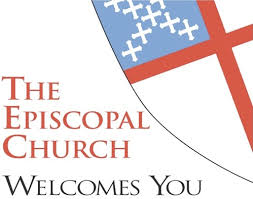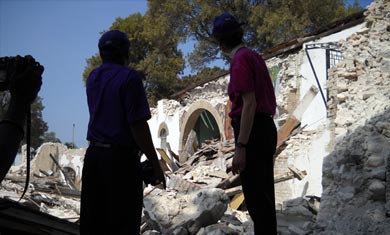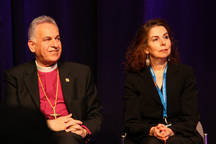Last month, headlines around the world screamed that the Episcopal Church in the United States had been suspended from the Anglican Communion because of its stance on same-gender marriage.
 To read those headlines, and the stories that ran below them, you would think that Episcopal Church was in dire trouble and had been sent to a three-year time-out for extreme misbehavior.
To read those headlines, and the stories that ran below them, you would think that Episcopal Church was in dire trouble and had been sent to a three-year time-out for extreme misbehavior.
It took several days before all the rumors were squashed and the truth instead declared: The Primates of the Anglican Communion (the senior bishops in each church province) are not pleased that the Episcopal Church has approved same-gender marriages and want the Episcopal Church to refrain from participating in some of the discussions that take place worldwide. Apparently, the primates seem to think that asking the Episcopal Church to sit on the sidelines for three years will cause the Episcopal Church to change its mind on how to treat people with love.
There are two things to know about this whole contretemps:
First, the Primates who gathered do not have the authority to even make this request, because the Anglican Communion doesn’t work like that.
And second, but much more important, know this: The Episcopal Church is alive and well, and will continue to carry out its mission and ministry in the world, regardless of what anyone says.
and well, and will continue to carry out its mission and ministry in the world, regardless of what anyone says.
Let’s be honest: This is a complicated story, because the Anglican Communion is a complicated organization. It is not governed by a set of church laws, and each province is independently formed and run. It is a relationship-based network of churches. For those of us inside the Church, we could spend hours, days, months, years, discussing what happened in England in January (and trust me, we will).
But trying to parse out what happened, and worrying about what might happen, is to miss the whole point of the Gospel of Jesus Christ, which is to love.
Pure and simple, the Church is called to spread the love of God in the world.
And that is what the Episcopal Church continues to do, regardless of what anyone anywhere says.
This whole debate comes down to the fact that we – meaning, all the members of the Anglican Communion – interpret the Gospels differently. In the Episcopal Church, we formally have made the decision to declare, by word and deed, that “all means all,” that God’s love is not restricted by color, by gender, by sexual orientation or identity, by language, by ethnicity, or by any other thing that humans use to distinguish themselves.
Because in the Episcopal Church, we are firm in our belief that all of us are beloved children of God, and all will be treated with the same love.
That’s it. That’s our baseline.
You are a beloved child of God. And you. And you. Every single one of you. All of us are beloved children of God.
God loves all of you. And each of you.
 And since that is our baseline, our truth, that is what we as Episcopalians are going to do.
And since that is our baseline, our truth, that is what we as Episcopalians are going to do.
We are going to love you.
We are going to do our best to take care of you.
To treat you with dignity.
To welcome you in our churches.
To encourage you to be leaders in our churches, and in our Church.
To stand up for you when you need someone to have your back.
To do our best to right the wrongs of this world.
To bring you food when you are hungry, and give you water when you are thirsty, and visit you when you are in prison, and pray for you when you are ill.
To celebrate who you are, and how God made you.
To shout from the mountaintops that God’s love is more than enough to right the wrongs of the world, and then to act on that love.
Brass tacks: The leaders of the Anglican Communion are in disagreement with each other and with the Episcopal Church as to how we are going to love God and love one another as ourselves, how we are going to love one another as Jesus loves us.
But this disagreement will not, in any way, stop the Episcopal Church as a whole, and Episcopalians individually, from living into our Baptismal Covenant.
As our Presiding Bishop and Primate Michael B. Curry said following the meeting, “We are part of the Jesus Movement, and the cause of God’s love in this world can never stop and will never be defeated.”
Because no one and nothing can ever stop God’s love from being proclaimed and lived.
• • •
This column was written for InsideSources.com. For an alternative viewpoint, go to Counterpoint: Curing American Myopia.













